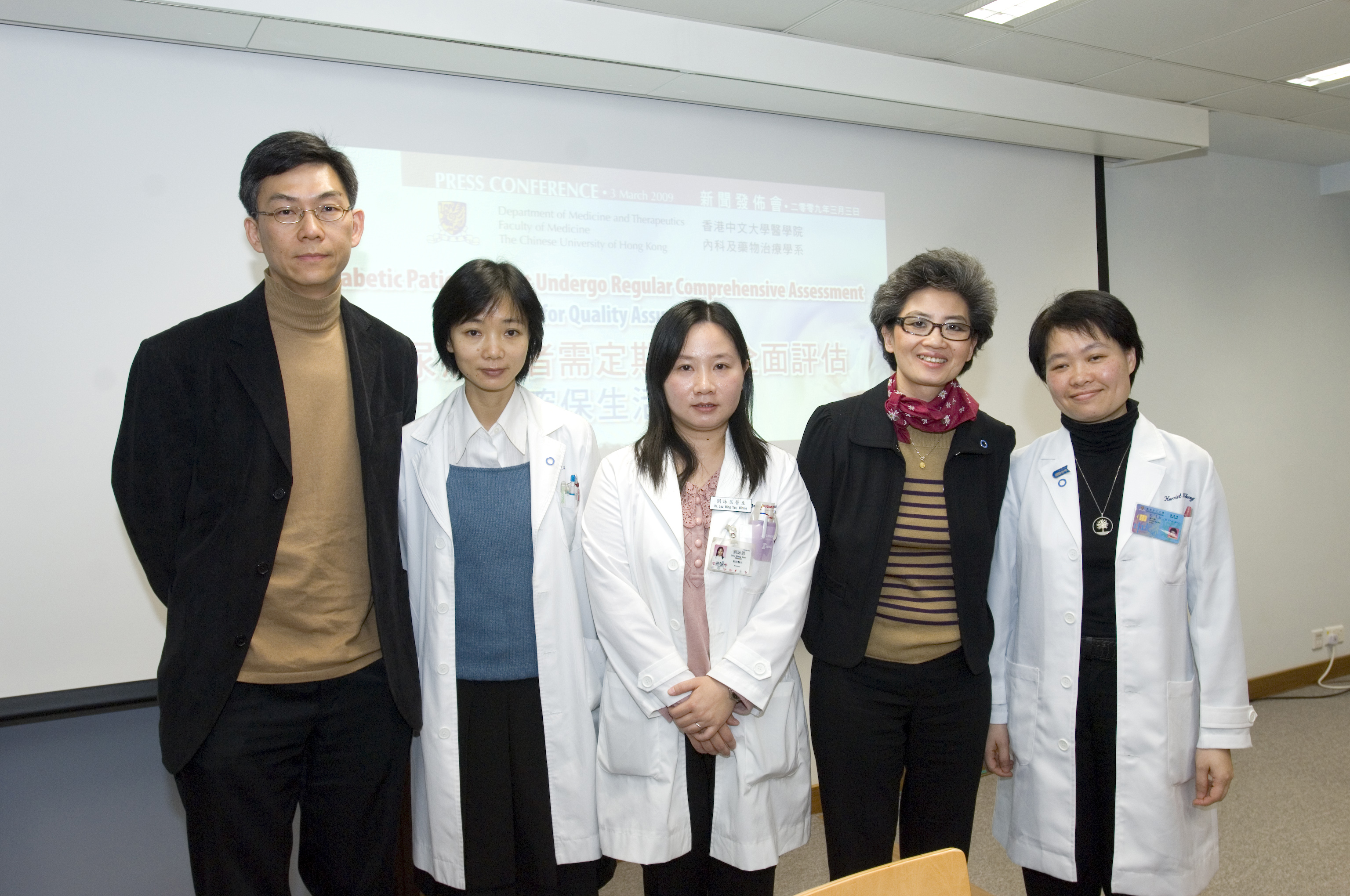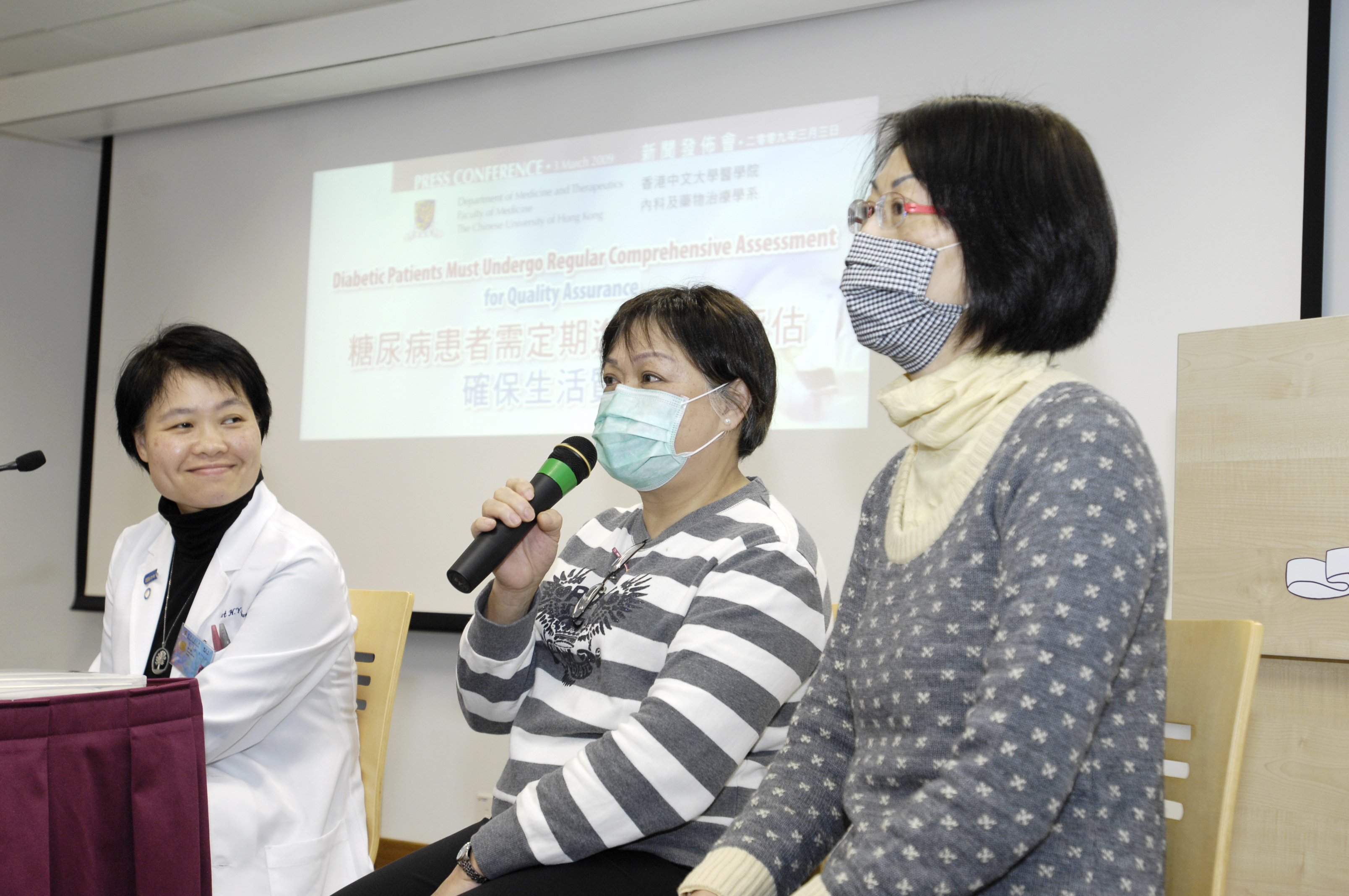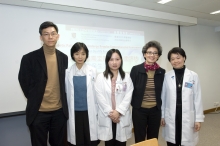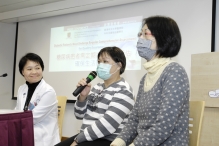CUHK
News Centre
Diabetic Patients Must Undergo Regular Comprehensive Assessment For Quality Assurance
Since the opening of Yao Chung Kit Diabetes Assessment Centre at The Chinese University of Hong Kong (CUHK) on 3 March last year. 2,015 diabetic patients have undergone comprehensive assessments including blood and urine tests as well as eyes and feet examination.
Of these 2,015 patients, 57.8% were self referrals while 43.2% were referred by their attending doctors. Using A1c <7%, Blood pressure <130/80 mmHg and LDL-Cholesterol <2.6 mmol/L as treatment targets, the percentages of patients on these targets were 33.1%, 32% and 22.3% respectively.
The Hong Kong Diabetes Risk Equations were used to estimate the 5-year probability of stroke, heart disease and kidney failure based on the results from these assessments. It was revealed that 6.9% belonged to the very high risk group (more than 30% of them were at risk of developing any one of these major events in 5 years), 10.9% belonged to the high risk group (more than 20% of them were at risk) and 22.8% belonged to the moderate risk group (more than 10% of them were at risk). Besides, 30% of them had eye complications and 15% had heart disease or kidney failure.
“Every year, 2-10% of diabetic patients develop major events depending on their risk profiles. Yet, many of these life threatening complications are preventable and treatable. There is now firm evidence showing that reaching multiple treatment targets reduces the risk of death and cardio-renal complications by 25-75%,” said Dr. Wing-yee So, Clinical Assistant Professor (honorary), Department of Medicine and Therapeutics, Faculty of Medicine, CUHK.
Amongst the patients who were referred by their attending doctors, 24% were at 3 treatment goals. In the self referral group, 9.9% of them were not under regular medical follow up. Of these, 11.5% were at 3 treatment goals. In the remaining self referred patients receiving regular medical treatments either in the private or public sector, 14.7% were at 3 treatment goals.
“In a recently published international survey comprising 5,888 type 2 diabetic patients from 8 Asian countries, only 5% of patients were at 3 treatment goals. Approximately 25-35% of these Asian patients never had their eyes or feet examined or A1c measured in the last 24 months,” said Dr. Winnie Lau, Clinical Tutor (honorary), Department of Medicine and Therapeutics, Faculty of Medicine, CUHK.
In a 20-year long-term study from UK, a reduction in 0.9% A1c was translated to 20-30% reduction in all diabetes-related complications including death. These beneficial effects became increasingly apparent and strong over time. “Early detection of complications and intensive control of risk factors save life and money in the long term. However, early diabetic complications, such as eye and kidney damage, often lack symptoms and thus are frequently overlooked, resulting in delayed presentations when treatments are often ineffective and expensive. Patients with diabetes should take a proactive role and discuss with their attending doctors regarding their need to undergo diabetic complication screening every 12-18 months for quality assurance purpose,” commented Professor Juliana Chan, director of the Yao Chung Kit Diabetes Assessment Centre.
Yao Chung Kit Diabetes Assessment Centre is a non-profit-making centre, supported by a donation to The Chinese University of Hong Kong to make these comprehensive assessments more accessible, affordable and sustainable. The Centre is located on the 4th Floor, Block B, Staff Quarter, Prince of Wales Hospital, Shatin. It is open from 8:45a.m. to 5:30p.m., Monday to Thursday and 8:45a.m. to 5:45p.m on Friday. Patients can either contact the Centre on their own or be referred by their attending doctors.
For enquiries, please visit our website at www.yckdac.hkido.cuhk.edu.hkor contact us on 2647-8806. Patients or doctors can download the referral form from the website and fax it to 2947-8495 to book an appointment.
From Left: Dr. Tin Choi KO, Deputy Director, Yao Chung Kit Diabetes Assessment Centre; Dr. Wing Yee SO, Clinical Assistant Professor (honorary), Department of Medicine and Therapeutics; Dr. Winnie Wing Yan LAU, Clinical Tutor (honorary), Department of Medicine and Therapeutics; Professor Juliana Chung Ngor CHAN, Director, Yao Chung Kit Diabetes Assessment Centre and Ms. Harriet CHUNG, Nurse, Yao Chung Kit Diabetes Assessment Centre





